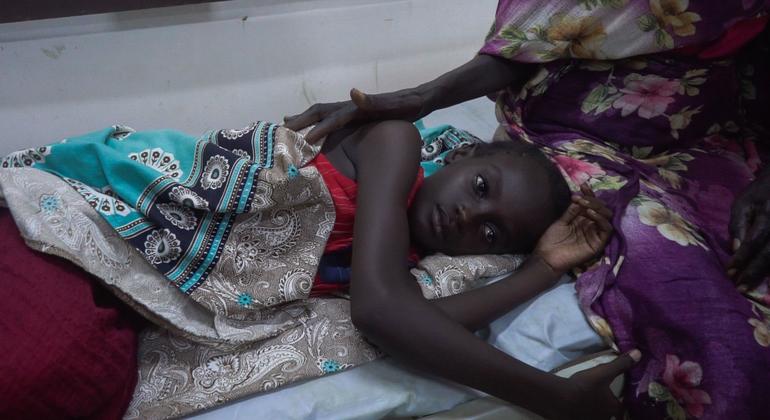Sexual violence and hunger stalk displaced Sudanese

Speaking from Sudan, UNICEF (UNICEF) spokesman James Elder described meeting a senior medical worker at a hospital outside Khartoum who had “direct contact with hundreds and hundreds of women and girls, some as young as eight, who had been raped. Many had been held for weeks at a time.”
Doctors from Al Nao hospital in Omdurman also spoke of “worrying numbers of babies born after rape – now abandoned”, a UNICEF spokesperson added in an update to journalists in Geneva via video link from the war-torn country.
countless horrors
He asserted that “countless atrocities” against children went unreportedusually due to very limited accessibility.
He also warned that without action, tens of thousands of Sudanese children could die in the coming months, “and that’s not the worst-case scenario… if there’s a measles outbreak, if there’s a diarrhoea outbreak, or if there are respiratory infections, then the already frightening outlook for children in Sudan will get much worse.
“In In current living conditions, with heavy rains and floods, these diseases will spread like wildfire.“ .
Echoing that bleak update, the UN migration agency, IOMagreed that the floods had added to the daily challenges faced by millions of people whose lives have been upended by the battle for control of the country between rival military forces that began in April 2022, stemming from the 2019 overthrow of longtime President Omar al-Bashir.
Fears of famine have become a reality
Earlier this month, global food security experts at the Famine Assessment Committee (FRC) on the Integrated Food Security Phase Classification (IPC) reported famine conditions in some areas of North Darfur including Zamzam camp near the town of Al Fasher.
The refugee camp is home to half a million displaced people, facing severe food shortages that are leading to malnutrition and death. Thirteen other areas are on the brink of famine.
“The extent of the devastation caused by the escalating violence in the town of El Fasher is profound and heartbreaking.”, the authors of the IPC report note, amid “persistent, intense and widespread clashes [that] has forced many residents to seek refuge in refugee camps, where they face a harsh reality: little or no basic services, compounding the hardship of displacement.”
According to IOM, most internally displaced people across Sudan – 97 percent – are in areas with severe food insecurity or worse.

Floods in Sudan have displaced 20,000 people since June.
The staggering movement
Worryingly, the latest data from the UN agency shows that displacement continues to rise, with more than 10.7 million people seeking safety within the country and many displaced twice or more. Fighting in Sennar state alone displaced more than 700,000 people last month, of whom 63 percent were originally displaced from other states, the majority from Khartoum.
Speaking via video to journalists in Geneva from Port Sudan, IOM Chief of Mission in the country, Mohamed Refaat, said one in three internally displaced Sudanese are from Khartoum.Almost the entire capital of the country was evacuated.So imagine the scale of this shift,” he said.
Citing ongoing obstacles to aid access that have prevented UN humanitarian workers and partners from reaching some of the most vulnerable civilians in Sudan, the IOM official said that a large number of civilians remain “trapped” in a “very hostile war environment” and lack access to health care. Many have had to walk long distances to secure food amid “skyrocketing” prices. “There are shortages of everything,” Refaat explained, noting that “militias” have also taken control of various locations, restricting the movement of non-combatants.


